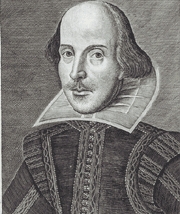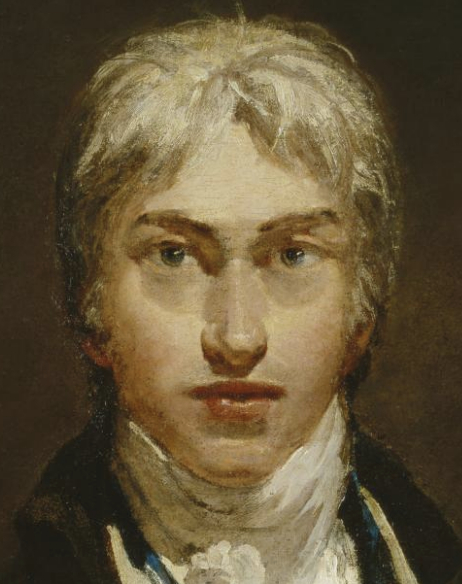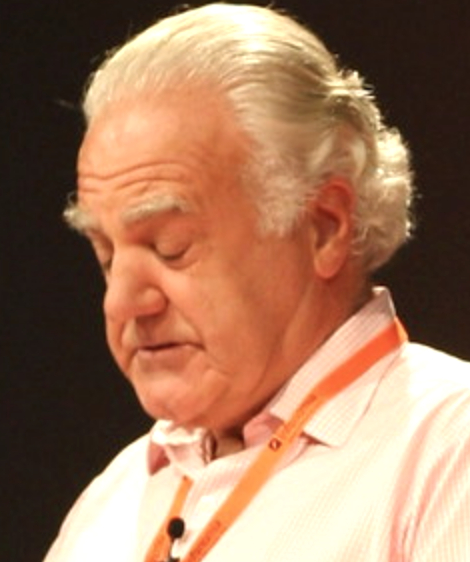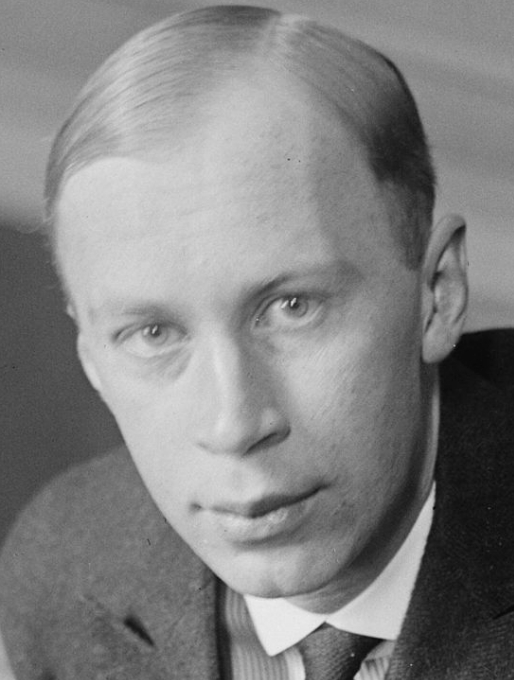April 23
William Shakespeare

On this date in 1564, William Shakespeare was born in Stratford-upon-Avon, Warwickshire, England. The master playwright was eulogized by 19th-century agnostic orator Robert Green Ingersoll. In one of his famous lectures, Ingersoll said that when he read Shakespeare, “I beheld a new heaven and a new earth.” (The Works of Robert G. Ingersoll, Interviews, Vol. IV) “Think of the different influence on men between reading Deuteronomy and ‘Hamlet’ and ‘King Lear.’ … The church teaches obedience. The man who reads Shakespeare has his intellectual horizon enlarged,” said Ingersoll in Vol. VIII.
No one knows Shakespeare’s personal religious views, although he certainly was not orthodox. He was born under the rule of Elizabeth I, who was Protestant and outlawed Catholicism, and was succeeded by James I, who continued Elizabeth’s policies despite his mother Mary Stuart’s Catholicism. Shakespeare’s parents were likely covert Catholics. His father John was close friends with William Catesby, father of the head conspirator in the Catholic “gunpowder plot” to blow the Protestant monarchy of James I to smithereens in November 1605.
Shakespeare put many different types of sentiments into the mouths of his characters. The bard’s philosophy seems most succinctly described in the famous “Seven Ages of Man” speech from “As You Like It,” which begins: “All the world’s a stage / And all the men and women merely players: / They have their exits and their entrances …” ending with “mere oblivion. / Sans teeth, sans eyes, sans taste, sans everything.”
In “King Lear,” the Duke of Gloucester laments in Act 4, Scene 1, “As flies to wanton boys, are we to the gods; they kill us for their sport.” Victorian poet, playwright and novelist Algernon Swinburne put it this way: “Shakespeare was in the genuine sense — that is, in the best and highest and widest meaning of the word, a Freethinker.” He died unexpectedly at age 52, cause unknown. (D. 1616)
"In religion, what damned error, but some sober brow will bless it and approve it with a text, hiding the grossness with fair ornament?"
— Bassanio in "The Merchant of Venice," Act III, Scene II (c. 1596-99)
J.M.W. Turner

On this date in 1775, Joseph Mallord William Turner was born in London. A precocious artist, he was 15 when one of his paintings was exhibited at the Royal Academy, a great honor.
He became a highly successful painter who traveled widely and innovated his own light-filled technique. His brilliant paintings, notably of seascapes or ambitious, romantic visions of nature, anticipated impressionism. The critic John Ruskin called him “the father of modern art.” When Turner died, he left all of his paintings to Great Britain and his fortune to found a place for what he called “decaying artists.”
According to Joseph McCabe’s A Biographical Dictionary of Modern Rationalists (1920), Ruskin often referred to Turner as “an infidel.” P.G. Hamerton in The Life of J.M.W. Turner (1879) wrote that the painter “did not profess to be a member of any visible Church.”
Franny Moyle, author of Turner: The Extraordinary Life and Momentous Times of J.M.W. Turner (2016), said in a 2017 interview with the History News Network: “My personal hunch is that he may well have been a Deist. Much of his work resounds with Deism that was popular in London in the 1790s and was espoused by those who opposed organized religion and considered instead that nature provided the necessary and sufficient means to experience God.”
Turner never married but had two long-term relationships with women and fathered two daughters by one of them, Sarah Danby. He died of cholera at age 76 in 1851.
PHOTO: Turner self-portrait, cropped.
“As a child he was sent to a Methodist school in Margate, but as a young man there are accounts of him eschewing church in favor of continuing to sketch.”
— Biographer Franny Moyle on Turner, History News Network interview (April 21, 2017)
Peter Watson

On this date in 1943, Peter Frank Patrick Watson was born in Birmingham, England. An intellectual historian and investigative journalist, he was educated at the universities of Durham, London and Rome, later living in the U.S. He has written for The Observer, The New York Times, Punch and The Spectator and is the author of fiction, as well as many books on art history, biography, psychology and true crime. Between 1997 and 2007, he was a research associate at the Illicit Antiquities Research Centre at Cambridge University.
His books include The Age of Nothing: How We Have Sought to Live Since the Death of God (2014, published in the U.S. as The Age of Atheists: How We Have Sought to Live Since the Death of God), The Medici Conspiracy: The Illicit Journey of Looted Antiquities from Italy’s Tomb Raiders to the World’s Greatest Museums (2006, with Cecilia Todeschini), Ideas: A History of Thought and Invention, from Fire to Freud (2005), Modern Mind: An Intellectual History of the 20th Century (2001) (also published as A Terrible Beauty), Sotheby’s: The Inside Story (1998), Landscape of Lies (1989) and The Caravaggio Conspiracy (1984).
In Ideas: A History of Thought and Invention, Watson seeks a new way to tell the history of the world from prehistory to modern day, asserting that human knowledge is divided into two realms: inward (philosophy and religion) and outward (observation and science). His stance supports the latter. Twins: An Uncanny Relationship? (1982), explores behavior patterns shared by identical twins, “to offer a rational alternative to mumbo jumbo for explaining many of the coincidences reported in twin studies, ” according to a Los Angeles Times review.
“A few saints and a little charity don’t make up for all the harm religion has done over the ages,” he said on CBC News, May 5, 2007. When asked about the good that religion has done in the world in an interview by The New York Times Magazine (Dec. 11, 2005), Watson replied: “I lead a perfectly healthy, satisfactory life without being religious. And I think more people should try it.”
PHOTO: Watson speaking at Cambridge in 2008; Juan Jaen photo under CC 2.0.
"Religion has kept civilization back for hundreds of years, and the biggest mistake in the history of civilization, is ethical monotheism, the concept of the one God. Let’s get rid of it and be rational."
— Watson interview, CBC News (May 5, 2007)
Sergei Prokofiev

On this date in 1891, one of the 20th century’s most popular composers, Sergei Sergeyevich Prokofiev, was born in Sontsovka in what is now Ukraine. Prokofiev composed works in many genres, including the opera “War and Peace,” the ballet “Romeo and Juliet,” the children’s piece “Peter and the Wolf,” for which he is best known in the West, and the score for the film “Alexander Nevsky” (1938).
Prokofiev was not raised in a religious household and never used an explicitly religious setting. His opera “The Fiery Angel” addressed religious themes but is not complimentary to organized religion. Some of his early works such as the “Scythian Suite” were inspired by Russian folklore and paganism. Prokofiev showed a talent for piano and composition at a very young age and was encouraged in this by his mother, who also took him to musical performances. In 1904 he and his mother moved to St. Petersburg, where he studied at the St. Petersburg Conservatory for 10 years.
Following the Revolution, Prokofiev spent most of his time outside of the Soviet Union, only returning occasionally and never formally accepting Soviet citizenship. He married the Spanish singer Lina Llubera in 1923, and they moved to Paris. They had two sons together. In the spring of 1936, when commissions were hard to come by from Western patrons, Prokofiev moved to Moscow along with his family.
After this time, he only left the USSR once, on a tour of America. He married Mira Mendelson in 1948 after leaving Lina in 1941. Prokofiev survived the purges but the tensions and times took a toll on his health. He had gradually fallen out of favor with Stalin and had few friends at the time of his death at age 61, having outlived Stalin by perhaps a few minutes. Because of the period of mourning for Stalin, Prokofiev’s funeral was small and news of his death was not widely reported. (D. 1953)
"At home we didn’t talk about religion. So, gradually the question faded away by itself and disappeared from the agenda. When I was nineteen, my father died; my response to his death was atheistic."
— Prokofiev, "Sergei Prokofiev: A Biography" by Harlow Robinson (1987)
John Oliver

On this date in 1977, John William Oliver — humorist, TV show host and cultural commentator — was born in Erdington, England, to Carole and Jim Oliver. His mother was a music teacher and his father was a school headmaster and social worker. Oliver played the viola as a child.
He graduated in 1998 from Cambridge University with an English degree after participating and serving as an officer in the school’s theatrical club. He had numerous TV and radio comedic and dramatic roles exhibiting his penchant for satire and mordant wit. His first major stand-up appearance was at the 2001 Edinburgh Fringe Festival.
Oliver became widely known to U.S. audiences in 2006 as a correspondent on “The Daily Show With Jon Stewart” on Comedy Central. He appeared on 356 episodes and was a writer on 962 episodes. In 2013, while Stewart took a leave of absence to direct the movie “Rosewater,” Oliver stepped in to host 32 episodes.
His TV show “Last Week Tonight” debuted in 2014 and as of this writing in 2024 had aired 305 episodes on HBO and Max. He has garnered 16 Emmy Awards for the show. He has also appeared in a number of films and TV series such as “The Lion King,” “The Smurfs” and 19 episodes of “Community.” He became a naturalized U.S. citizen in 2019.
Religion is one topic he ably covers. He has talked about attending Anglican services as a child but deciding by the time he was a teen that “I just didn’t believe in it.” He described the church as “very dour, monotone, like, you mumble your prayers and then you return to the holes that you came out of.” The deaths of several schoolmates and his uncle devastated him, and the answer he got that it was God’s will “kind of knocked me out of it. You just think … if that’s true, then I want nothing to do with this.” (“Fresh Air With Terry Gross, March 7, 2018)
In 2015 he announced the formation of Our Lady of Perpetual Exemption as a legally recognized religion in the U.S. with the goal of highlighting televangelists reaping millions in earthly rewards while claiming tax-exempt status. Viewers sent donations that Oliver redirected to Doctors Without Borders.
He later created two spinoffs of the church. Our Lady of Choosing Choice operated a vehicle labeled “Vanned Parenthood” in segments exposing “crisis” pregnancy centers masquerading as women’s health care facilities. Our Lady of Perpetual Health, actually chartered in Florida, owned an unregulated health care sharing ministry named JohnnyCare. These religious nonprofits typically use morality clauses to deny coverage, which is minimal in the first place. For $1.99, Our Lady of Perpetual Health enrollees got a first-aid kit comprised of three Band-Aids.
In 2011, Oliver married Kate Norley, a Virginia native who served in Iraq as a U.S. Army combat medic and mental health specialist. They met at the 2008 Republican national convention when he was working on a story for “The Daily Show” and she was representing Vets for Freedom. She is also involved with Team Rubicon, a nonprofit that sends veterans and first responders around the world to assist after natural disasters. They have sons born in 2015 and 2018.
Asked if he at some point was going to expose his firstborn, then age 2, to religion, Oliver said: “I guess I would be fine with him trying it. I’ll take him to whatever faith he would like to try out. … At the moment, I’m just trying to introduce him to avocados, let alone institutionalized religion.” (Ibid., “Fresh Air”)
FFRF’s Action Fund named Oliver a Secularist of the Week in June 2024 for publicly opposing Project 2025, a 900-page blueprint detailing actions Donald Trump should take if reelected in order to ensure the supremacy of religious and conservative values while gutting representative government.
PHOTO: Oliver at the Montclair Film Festival in 2016; Neil Grabowsky photo under CC 2.0.
“I was not that rebellious as a kid, but I was really done with church in a pretty big way. And I think they could probably feel that this wasn’t just a petulant tantrum. This was more, there’s nothing here that is helping me get through what I’m going through.”
— Oliver, explaining his loss of faith by the time he was a teen. ("Fresh Air With Terry Gross, March 7, 2018)
